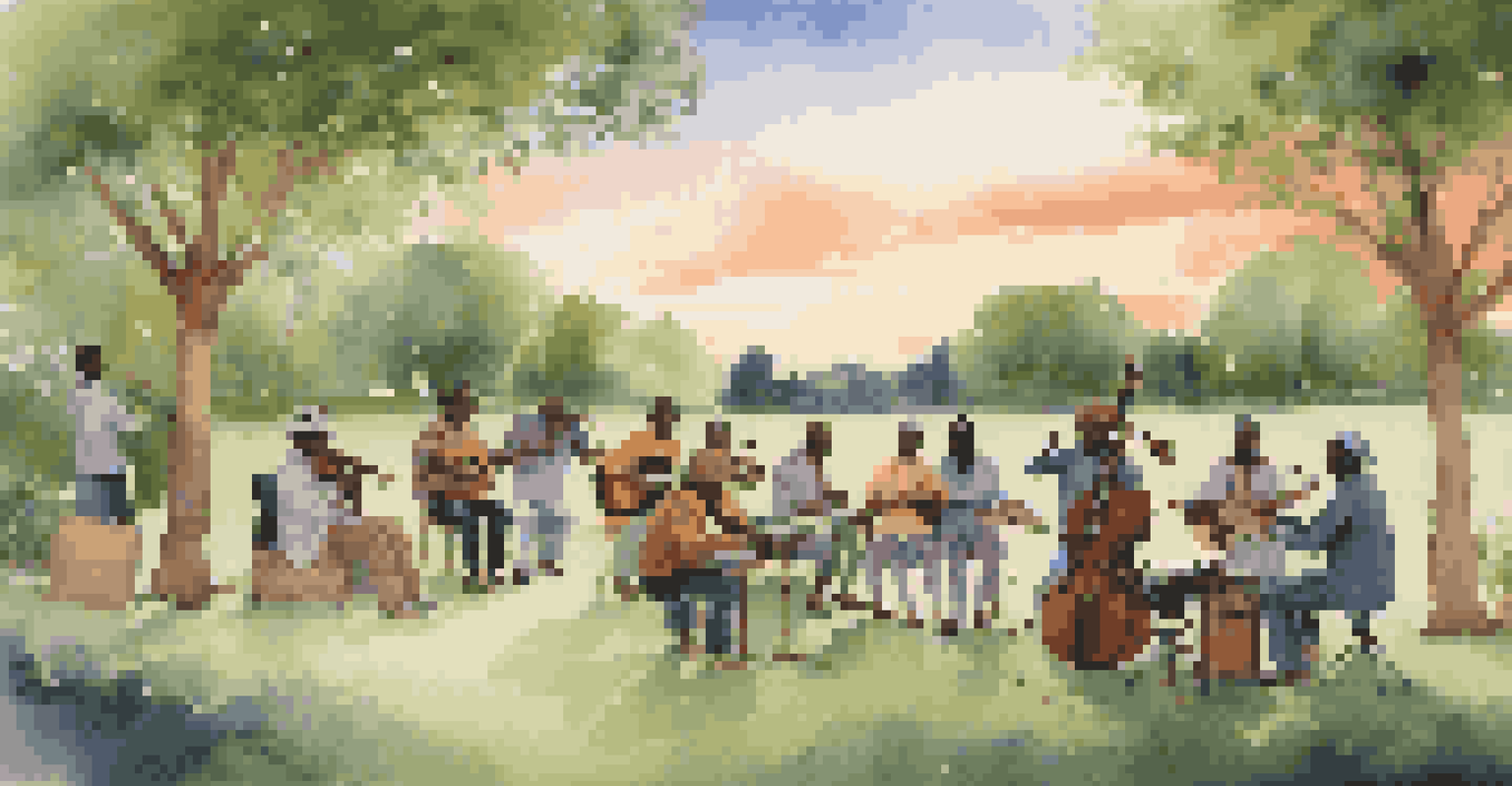Exploring World Music: Diverse Traditions and Their Influences

Understanding World Music: A Global Perspective
World music encompasses a vast array of styles from different cultures, reflecting the unique histories and traditions of various communities. It's not just a genre; it's a celebration of diversity, showcasing the sounds of everything from African drumming to Indian classical music. This genre invites listeners to step outside their comfort zones and explore the rich sonic landscapes that exist beyond Western music.
Music can change the world because it can change people.
When we think about world music, it’s essential to recognize the influences that have shaped these traditions. For instance, the fusion of African rhythms with jazz in the United States has created a dynamic genre that resonates globally. By understanding these connections, we can appreciate how music transcends borders and unites us through shared experiences.
Listening to world music can also be a powerful tool for cultural exchange. It fosters empathy and understanding, as we engage with the stories and emotions behind each melody. In a world that often feels divided, the universal language of music reminds us of our shared humanity.
The Role of Traditional Instruments in World Music
In every culture, traditional instruments play a significant role in defining its musical identity. For example, the sitar in India, the djembe in West Africa, and the didgeridoo in Australia each carry unique sounds that tell stories of their origins. These instruments are often crafted using age-old techniques, preserving cultural heritage while adapting to modern influences.

Listening to the distinct sounds of these instruments can transport you to their places of origin. Imagine the vibrant rhythms of a flamenco guitar echoing through the streets of Seville or the haunting notes of a Native American flute resonating in the mountains. Each sound encapsulates the spirit of its culture, inviting listeners to explore its roots.
World Music Celebrates Diversity
World music encompasses a variety of styles from different cultures, reflecting unique histories and inviting listeners to explore the richness beyond Western music.
Moreover, the blending of traditional instruments with contemporary styles has led to fascinating new genres. Many artists are now experimenting with electronic sounds alongside traditional music, creating innovative fusions that appeal to a broader audience. This evolution showcases the adaptability of world music while honoring its foundations.
Folk Music: Rooted in Tradition and Storytelling
Folk music serves as a direct link to a community's history, often passed down through generations. Each song tells a story, whether it’s about love, loss, or cultural identity, reflecting the collective experiences of its people. For instance, Irish folk music often features ballads that recount tales of struggle and resilience, connecting listeners to their ancestral roots.
Without music, life would be a mistake.
In many cultures, folk music is not just for listening—it's a participatory experience. Community gatherings often feature sing-alongs and dances, bringing people together to celebrate their heritage. This social aspect reinforces the idea that music is not just an art form but a vital part of community life.
As globalization continues to influence music, folk traditions face both challenges and opportunities. While some may fear the dilution of their heritage, others embrace the chance to share their stories on a larger stage. This dynamic interplay ensures that folk music remains relevant while honoring its traditional roots.
The Impact of Migration on World Music
Migration has long been a catalyst for musical evolution, introducing new sounds and styles to different regions. When people move, they bring their musical traditions with them, leading to fascinating blends of genres. For instance, the arrival of immigrants in the United States gave rise to genres like salsa and zydeco, which are vibrant fusions of various cultural influences.
These musical exchanges not only enrich the local music scene but also highlight the interconnectedness of our world. As artists collaborate across borders, they create innovative sounds that reflect their diverse backgrounds. This sharing of musical ideas fosters creativity and encourages a sense of belonging in a globalized society.
Migration Fuels Musical Evolution
The movement of people introduces new sounds and styles, leading to fascinating blends of genres that highlight our interconnected world.
However, it's important to recognize the challenges migration can bring to cultural preservation. As communities evolve, there’s a risk of losing traditional practices. Yet, many artists are finding ways to honor their heritage while embracing new influences, creating a beautiful tapestry of sound that respects the past while looking to the future.
How Technology is Reshaping World Music
In the digital age, technology plays a pivotal role in shaping the landscape of world music. With platforms like YouTube and Spotify, artists can share their music with a global audience, breaking down geographical barriers. This accessibility allows listeners to discover diverse genres from the comfort of their homes, fostering a greater appreciation for world music.
Moreover, technology has enabled musicians to collaborate in real-time, regardless of their physical location. Imagine a musician in Brazil teaming up with an artist in India to create a mesmerizing track that blends their unique styles. This cross-pollination of ideas not only enriches the music but also promotes cultural exchange.
However, the digital realm also presents challenges, such as the risk of homogenization. As artists strive for global appeal, there’s a concern that unique traditions may get lost in the pursuit of mainstream success. Finding a balance between embracing technology while staying true to one’s roots is crucial for the sustainability of world music.
The Influence of Globalization on Music Genres
Globalization has transformed the music landscape, leading to the rise of hybrid genres that blend traditional and contemporary styles. This fusion not only reflects the interconnected nature of our world but also showcases the rich tapestry of cultural influences. For instance, K-pop has gained international popularity by incorporating elements of hip-hop, electronic, and traditional Korean music, creating a unique sound that resonates globally.
As artists draw inspiration from various cultures, they contribute to a more inclusive musical dialogue. This exchange fosters understanding and appreciation for different traditions, allowing listeners to engage with music on a deeper level. It’s a reminder that music has the power to bridge divides and promote unity.
Technology Shapes Music's Future
Digital platforms allow artists to reach global audiences and collaborate across borders, reshaping the world music landscape while presenting challenges of cultural preservation.
However, as genres evolve, it’s essential to acknowledge and respect the origins of these musical styles. Artists must navigate the fine line between inspiration and appropriation, ensuring that they honor the cultures they draw from. By fostering a respectful approach, we can celebrate the beauty of diversity in world music.
Celebrating Diversity: World Music Festivals
World music festivals are vibrant celebrations that bring together artists and audiences from around the globe. These events provide a platform for cultural exchange, showcasing the richness of diverse musical traditions. From the iconic Glastonbury Festival in the UK to the globalized experience of WOMAD, these gatherings foster a sense of community and connection among attendees.
At these festivals, music becomes a vehicle for storytelling, allowing artists to share their cultural narratives with a wider audience. Imagine dancing to the infectious rhythms of African drummers or losing yourself in the melodies of a Middle Eastern ensemble. Each performance is an opportunity to experience the world through sound.

Moreover, world music festivals often promote awareness of social and environmental issues, using the power of music to inspire change. Many artists leverage their platforms to advocate for causes they believe in, reminding us that music can be a force for good. Attending these festivals not only enriches our musical knowledge but also connects us to a larger purpose.
Conclusion: The Future of World Music
As we explore the multifaceted world of music, it’s clear that its future is bright and full of possibilities. The blending of traditions, the influence of technology, and the celebration of diversity all point toward an exciting evolution. With each new generation of artists, we witness the continuous reinvention of genres and the emergence of fresh sounds that reflect our changing world.
Moreover, as listeners, we have the power to shape the future of world music by supporting artists who honor their cultural roots while embracing innovation. By exploring and appreciating diverse musical traditions, we contribute to a richer, more inclusive musical landscape. It's a collective journey that invites everyone to participate.
Ultimately, world music serves as a reminder of our shared humanity and our interconnectedness. As we celebrate the diverse traditions that exist across the globe, we also celebrate the power of music to unite, inspire, and transcend boundaries. The journey of exploring world music is just beginning, and the possibilities are endless.